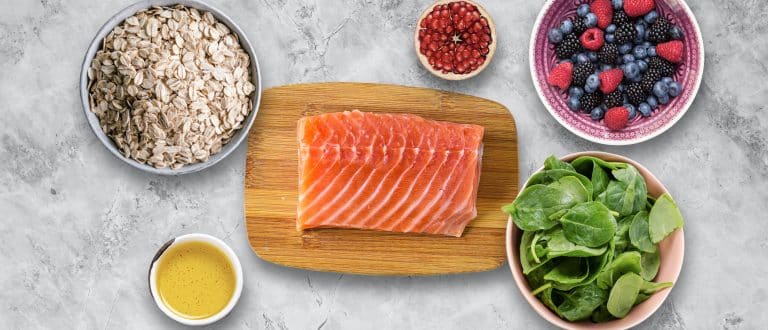Are Seed Oils Really Toxic? Here’s What an R.D. Says
30-Second Takeaway
- Seed oils are omega-6-rich vegetable oils like sunflower oil, canola oil, and soy oil, and are often found in ultra-processed foods like fast food, chips, and pastries.
- Experts are divided on whether they are healthy.
- Seed oils are high in omega-6 fats, which are healthy in small amounts, but when eaten in excess may contribute to chronic low-grade inflammation.
- However, research shows that they reduce (or don’t affect) your risk of mortality, and chronic disease like metabolic disease, cardiovascular disease, and cancer.
- Seed oils are fine when consumed in moderation, but may cause harm when consumed in excess.
If you’ve scrolled TikTok recently you may have seen an endless feed of videos claiming that seed oils—vegetable oils like sunflower oil, soy oil, and canola oil—are toxic. Google search results are split 50/50, and even experts are divided. So are seed oils bad for you?
The anti-seed oil camp stresses that seed oils—a rich source of omega-6 polyunsaturated fats (PUFAs)—are highly processed and pro-inflammatory. But nutritional scientists counter that while seed oils might trigger some inflammatory mechanisms, randomized-controlled trials largely find PUFAs have neutral to positive effects on the risk of mortality, cardiovascular disease, metabolic health, and cancer (1, 2, 3, 4, 5, 6).
So, should you avoid seed oils? Registered dietitian Kelsey Costa, M.S., R.D.N. is here to settle the score.
About the Expert
Kelsey Costa, M.S., R.D.N., is a registered dietitian nutritionist, nutrition consultant, master certified wellness coach, and author. She is the owner of Nutrition Insights LLC, a media and consulting company, and its flagship site, Dietitian Insights.
What Are Seed Oils?
Seed oil is a blanket term for omega-6 rich vegetable oils made from seeds—such as sunflower, cottonseed, safflower, and grape seeds. Soy, corn, and canola oil are also referred to as seed oils.
Most seed oils are highly processed, due to the extensive measures needed to extract the oil from the seeds or leaves. They’re typically made using high heat or toxic chemical solvents, and sometimes additional processing like bleaching and deodorizing are involved—which helps improve the taste and color of the oils and extend their shelf life.
Seed oils make up around 10 percent of calorie intake in the average American diet (7). They’re everywhere: Seed oils are used to make fast food fried favorites like french fries and chicken nuggets. Seemingly healthy snacks—like protein bars—contain seed oils too. Even most nutrient-packed salads and stir-fries at the Whole Foods hot bar (the mecca of healthy food in a pinch) include seed oils as a main ingredient.
Are Seed Oils Bad For You?
According to Costa, seed oils provide some benefits when consumed in moderation. “Seed oils contain primarily polyunsaturated fatty acids, which can be beneficial for lowering cholesterol levels,” she explains. That said, there are some reasons why they aren’t always the healthiest choice:
They disrupt the omega-6 to omega-3 ratio
Omega-6 fatty acids aren’t a problem in and of themselves, says Costa. In fact, they can lower LDL (bad) cholesterol, boost HDL (good) cholesterol, and boost insulin sensitivity, according to Harvard Medical School. However, eating too many omega-6 fatty acids relative to omega-3’s has been linked to chronic low-grade inflammation (8).
Experts believe the ideal omega-6 to omega-3 ratio is somewhere between 1:1 and 4:1 (9, 10). Unfortunately, the overconsumption of processed oils in fast and pre-packaged food in the average American diet currently stakes that ratio at 20:1—that’s essentially asking for inflammation.
They’re prone to oxidation
Many seed oils have a high smoke point, meaning you can crank up the temperature without burning your food. This makes them a perfect candidate for frying. The problem: “When seed oils are heated, the fatty acids may oxidize and form harmful compounds (11),” says Costa. Those harmful compounds, called free radicals, wreak havoc on cells and cause inflammation (AKA oxidative stress).
To make matters worse, oils that have been repeatedly heated (like those in the deep fryer at a restaurant) are particularly susceptible to oxidation (12). Another reason to pass on donuts, french fries, and onion rings.
They’re not the *most* nutrient-dense choice
Thanks to the extensive processing required to transform delicate seeds into oil form, seed oils are stripped of natural vitamins, minerals, and antioxidants. “Cold-pressed oils such as olive, avocado, walnut, or flaxseed oils are richer in antioxidants and other beneficial phytonutrients,” says Costa.
They’re calorie-dense
Like other oils, seed oils are high in calories (~120 calories per tablespoon). You might not even realize you’re eating seed oils because they’re in everything from salad dressings to chips. Ultra-processed diets cause excess calorie intake and can lead to weight gain (13) and over time up your risk for cardiovascular disease, type 2 diabetes, and cancer (14, 15, 16).
Are Seed Oils Inflammatory?
If you eat too many of them, yes. “Overconsumption of omega-6 fatty acids from seed oils can lead to inflammation-related issues,” explains Costa. “The issue is primarily with the imbalance of omega-6s in our diets, the way these oils are repeatedly heated, and the foods they’re often found in,” she adds.
Ultra processed foods lack other anti-inflammatory nutrients like fiber and antioxidants to balance things out. “The combination of refined seed oil intake and a lack of nutrient density creates an environment that can lead to inflammation,” she says.
To top it off, most of us consume way too many omega-6-rich foods, and not enough omega-3’s (17). “It’s crucial to maintain a balance by incorporating more omega-3-rich foods like fish and chia seeds,” adds Costa.
So, Should You Avoid Seed Oils?
While having a salad with seed oil-based salad dressing once is unlikely to trigger chronic inflammation, it’s worth keeping tabs of your eating habits. “Ongoing research continually reveals ultra-processed foods’ alarming links to chronic diseases,” says Costa. “While the jury is still out on seed oils, consumers should still aim to reduce the main source of seed oils in their diet, that is, ultra-processed foods.”
The key says Costa, is to follow a few simple rules of thumb:
Moderation is key
Using a whole source of seed oil at home—such as a splash of canola oil to stir fry broccoli or sunflower oil in banana bread—is okay in moderation, but monounsaturated oils like avocado oil and olive oil are a better bet.
Choose more omega-3s
Incorporating more omega-3-rich foods like salmon, sardines, walnuts, and flax seeds into your diet will help balance out your omega-3 to omega-6 ratio. Plus, omega-3s can help fight inflammation, improve heart health, and boost brain health.
Limit processed foods that contain seed oils
Minimizing ultra-processed foods like fast food, chips, baked goods, and crackers that contain seed oil will automatically curb how many you eat.













